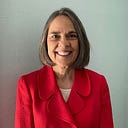Want to Empower Girls in Tech? Empower their Mothers Too

First Tuesdays are a special time at the Sunnyvale Public Library. Girls ages 8–12 line up with their mothers (or other significant female) at 6:30 PM for a Making program. Youth services librarian, Nancy Andrus, was inspired to create Make-HER, a Making program with a twist. What I especially like about this program is that it brings together girls and their mothers and encourages them to put down their cell phones and connect over hands-on projects. Projects are as creative and varied as the mentors that Andrus brings in to lead them — light-up Harry Potter wands, wearable technology, and optical illusion toys. The program was launched with funding from the Pacific Library Partnership of Innovation and is currently supported by the Friends of the Sunnyvale Library.
Public libraries have a unique opportunity to expand the reach of science, technology, engineering, and math (STEM). As accessible and trusted spaces in the community, libraries help to increase access for families who are underserved and underrepresented in STEM. In celebration of National Library Week, April 8–14, I share how the Sunnyvale Public Library is helping close the opportunity gap in STEM.
Three Bright Spots and Lessons Learned
1. Me too: Benefits for girls and mothers
Girls as young as 6 years old already have beliefs about computing that are gender-stereotyped. With these stereotypes, girls express less confidence and interest in tech pursuits like robotics and programming. Make-HER is working to reduce this confidence gap.
Most Maker workshops are open to all family members. Make-HER is just for mothers and their daughters. This is the “secret sauce” that builds confidence in both.
In a survey about science education, 36% of mothers reported that they didn’t feel confident enough in their scientific knowledge to help their children in science activities. Mothers in Make-HER shared that they usually redirect their daughters’ questions and requests for homework help involving math and technology to their husbands. Make-HER is helping change this dynamic. Mothers are learning new skills and seeing themselves in a new light. “I thought [the program] was for my daughter. It’s liberating for me as I got to do activities.”
Seeing their mothers becoming more confident and competent may help explain the increase in confidence that the mothers are seeing in their daughters.
2. Role models celebrate failures and promote courage
Andrus recruits women with technical savvy and a passion for STEM to lead the sessions. These LadyMakers — as they’re called — not only lead tech activities that are both challenging and fun but also serve as role models. They have diverse interests including fine arts, engineering, technology, and anthropology. Andrus shares, “LadyMakers model the many ways STEM can be used to express personal interests. I hope girls find their personal entry points to STEM.”
The role models also help bolster confidence and support growth mindset. LadyMaker Tenaya Hurst celebrated the engineer design process, mistakes and all. As Hurst checked in with the mothers and daughters, she asked, “Who got two lights not to work?” When some admitted that they were having problems, Hurst celebrated, “Failure, failure!” She playfully removed the stigma of failing and opened a conversation about successes and challenges. For females — who often are held back by lack of confidence, not their lack of ability — this support from Hurst was priceless.

3. The challenges and opportunities that come with increasing interest
Make-HER workshops fill up fast. For a recent program, there were 38 pairs on the waitlist. Many of the families who participate are repeat participants.
Should families be able to attend as often as they want, or should registration advantage new families?
Andrus ponders these questions and considers how to balance competing approaches for Make-HER. Andrus sees the benefits of deepening interest and skills with repeat engagement in the series as well as bringing in new families. Is there a way to think about these questions so the solution is not either/or?
To support more families, Andrus started an afterschool Maker program at Columbia Middle School to increase the library’s outreach. Andrus is also exploring the possibility of evening workshops for younger elementary-age girls and their mothers. Imagine how your library might inspire new champions of technology, one mother-daughter at a time!
I celebrate Nancy Andrus’ vision and effort to create, redesign, and sustain Make-HER. Andrus won the prestigious Library Journal Movers & Shakers 2016 award for Make-HER. You can read about Andrus’ work at the Sunnyvale Library on the Make-HER website.

